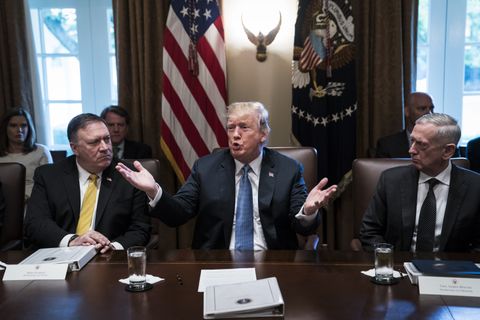 The past few days have not been kind to the US foreign and national security policy communities.
The past few days have not been kind to the US foreign and national security policy communities.
On Wednesday, the American envoy to Syria admitted that the United States is no longer seeking the ouster of Syrian dictator Bashar al-Assad, but rather that it wants the regime to modify its behavior. Later that day, President Trump, proclaiming victory over the Islamic State, unexpectedly announced that American troops will pull out of Syria, contrary to the counsel of his advisors. This unilateral decision was roundly criticized by academics, politicians, and practitioners alike, with many raising the twin specters of President Bush II’s “mission accomplished” speech in 2004, and President Obama’s withdrawal from Iraq in 2011.
While some raised concerns about the power vacuum the move would create in the region—allowing Turkey, Iran, Russia, the Assad regime, and the Islamic State greater room to maneuver—others noted that the move did not bode well for ongoing negotiations with Taliban leaders in Afghanistan, given that it seemingly portended further American withdrawal from the region. They likely did not expect how quickly their predictions would materialize, however.
The plot thickened on Thursday evening, with the announcements that Secretary of Defense James Mattis will retire at the end of February, and that the US will withdraw about half of its 14,000 troops from Afghanistan. In tendering his resignation, Mattis cited his differences with Trump regarding how the United States should treat its allies, especially the Kurds, who now find themselves caught between the Syrian and Turkish governments, both of whom have engaged in ethnic violence against them in the past (as has the Islamic State).
These decisions by POTUS reflect a growing unilateralism in his foreign policymaking, on two levels. First, the President has left US allies out in the cold, it seems, with his recent moves in the Middle East. His decisions have exposed the Kurds to Turkish and Syrian repression, and have significantly weakened the position of the Syrian opposition and the Afghan government in their respective negotiations.
Second, Trump has increasingly resisted the advice of politicians and advisors regarding Middle East policy. While Trump’s recent handling of the Khashoggi Affair is a poignant (and slightly more developed) example, his flurry of decisions on US involvement in Syria and Afghanistan serve to underscore this point. He ignored the recommendations of his advisors, so as to implement the policies he’s advocated for since the 2016 election.
Why is Trump doing this? One plausible explanation is that he has read the proverbial tea leaves, and, using the inertia of the recent Senate resolution to withdraw US support for the war in Yemen, has decided to pull back American influence (if not overreach) elsewhere in the Middle East. Indeed, this does not contradict his former policy of supporting Saudi efforts in Yemen, given that they served as a proxy by which to combat Iranian influence in the Persian Gulf. His recent decisions, however, seem to indicate a broader policy shift, whereby local actors in the region will take the lead in their own affairs, freeing up taxpayer dollars to support initiatives intended to advance the American common weal (whether his proposed policies will actually do this is another matter).
Regardless of his motives, Trump is increasingly consolidating control over decisionmaking in the national security and foreign policy arenas. While some pundits have expressed shock about his seemingly-spastic foreign policy decisions of late (and rightly so—they have been all over the place), they do fit into his overall “America First” policy lens. Trump’s quasi-realist foreign policy, for better or for worse, prioritizes American interests over those of other countries—their interests be damned.